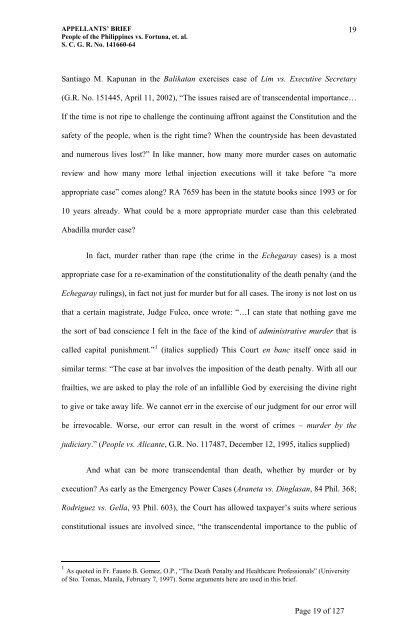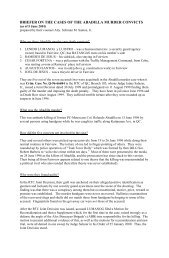Republic of the Philippines - Campaign
Republic of the Philippines - Campaign
Republic of the Philippines - Campaign
You also want an ePaper? Increase the reach of your titles
YUMPU automatically turns print PDFs into web optimized ePapers that Google loves.
APPELLANTS’ BRIEF<br />
People <strong>of</strong> <strong>the</strong> <strong>Philippines</strong> vs. Fortuna, et. al.<br />
S. C. G. R. No. 141660-64<br />
Santiago M. Kapunan in <strong>the</strong> Balikatan exercises case <strong>of</strong> Lim vs. Executive Secretary<br />
(G.R. No. 151445, April 11, 2002), “The issues raised are <strong>of</strong> transcendental importance…<br />
If <strong>the</strong> time is not ripe to challenge <strong>the</strong> continuing affront against <strong>the</strong> Constitution and <strong>the</strong><br />
safety <strong>of</strong> <strong>the</strong> people, when is <strong>the</strong> right time? When <strong>the</strong> countryside has been devastated<br />
and numerous lives lost?” In like manner, how many more murder cases on automatic<br />
review and how many more lethal injection executions will it take before “a more<br />
appropriate case” comes along? RA 7659 has been in <strong>the</strong> statute books since 1993 or for<br />
10 years already. What could be a more appropriate murder case than this celebrated<br />
Abadilla murder case?<br />
In fact, murder ra<strong>the</strong>r than rape (<strong>the</strong> crime in <strong>the</strong> Echegaray cases) is a most<br />
appropriate case for a re-examination <strong>of</strong> <strong>the</strong> constitutionality <strong>of</strong> <strong>the</strong> death penalty (and <strong>the</strong><br />
Echegaray rulings), in fact not just for murder but for all cases. The irony is not lost on us<br />
that a certain magistrate, Judge Fulco, once wrote: “…I can state that nothing gave me<br />
<strong>the</strong> sort <strong>of</strong> bad conscience I felt in <strong>the</strong> face <strong>of</strong> <strong>the</strong> kind <strong>of</strong> administrative murder that is<br />
called capital punishment.” 1 (italics supplied) This Court en banc itself once said in<br />
similar terms: “The case at bar involves <strong>the</strong> imposition <strong>of</strong> <strong>the</strong> death penalty. With all our<br />
frailties, we are asked to play <strong>the</strong> role <strong>of</strong> an infallible God by exercising <strong>the</strong> divine right<br />
to give or take away life. We cannot err in <strong>the</strong> exercise <strong>of</strong> our judgment for our error will<br />
be irrevocable. Worse, our error can result in <strong>the</strong> worst <strong>of</strong> crimes – murder by <strong>the</strong><br />
judiciary.” (People vs. Alicante, G.R. No. 117487, December 12, 1995, italics supplied)<br />
And what can be more transcendental than death, whe<strong>the</strong>r by murder or by<br />
execution? As early as <strong>the</strong> Emergency Power Cases (Araneta vs. Dinglasan, 84 Phil. 368;<br />
Rodriguez vs. Gella, 93 Phil. 603), <strong>the</strong> Court has allowed taxpayer’s suits where serious<br />
constitutional issues are involved since, “<strong>the</strong> transcendental importance to <strong>the</strong> public <strong>of</strong><br />
1 As quoted in Fr. Fausto B. Gomez, O.P., “The Death Penalty and Healthcare Pr<strong>of</strong>essionals” (University<br />
<strong>of</strong> Sto. Tomas, Manila, February 7, 1997). Some arguments here are used in this brief.<br />
Page 19 <strong>of</strong> 127<br />
19




